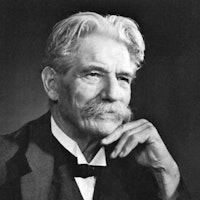Destiny… has to fulfill itself in a thousand ways, so that goodness may be actualized. What every individual has to contribute remains his own secret.
Destiny… has to fulfill itself in a thousand ways, so that goodness may be actualized. What every individual has to contribute remains his own secret.
Albert Schweitzer

Share in the Knowledge
Topic: Serving Others
Let no one measure himself by his conclusions respecting someone else. The destiny of men has to fulfill itself in a thousand ways, so that goodness may be actualized. What every individual has to contribute remains his own secret. But we must all mutually share in the knowledge that our existence only attains its true value when we have experienced in ourselves the truth of the declaration: ‘He who loses his life shall find it.’
Albert Schweitzer was born on January 14, 1875, in Kaysersberg, Alsace, into a family deeply rooted in the traditions of religion, music, and education. Both his father and maternal grandfather were Lutheran ministers, and his early exposure to church life, theological study, and classical music shaped his intellectual and spiritual development. He pursued theology and philosophy at the University of Strasbourg, earning a doctorate in philosophy in 1899 with a focus on Immanuel Kant’s religious thought. In 1900, he received his licentiate in theology. His academic and pastoral work during this period included preaching at St. Nicholas Church and serving in leadership roles at the Theological College of St. Thomas. In 1906, he published The Quest of the Historical Jesus, a critical work that contributed to modern theological scholarship.
Alongside his theological and philosophical work, Albert Schweitzer was a gifted musician. He began studying piano and organ in childhood and was performing publicly by the age of nine. He went on to become an internationally known concert organist, using income from performances to fund both his education and later medical missions. As a musicologist, he published a biography of Johann Sebastian Bach in 1905 and contributed to the study of organ building and playing. In 1905, he made a pivotal decision to study medicine with the goal of becoming a medical missionary. He earned his medical degree in 1913 and soon after established a hospital in Lambaréné, French Equatorial Africa, where he and his wife later endured internment during World War I.
After returning to Lambaréné in 1924, Albert Schweitzer dedicated the remainder of his life to expanding and maintaining the hospital, which grew into a complex capable of treating hundreds of patients. He combined the roles of physician, surgeon, pastor, administrator, writer, and host, drawing on his wide range of training and experience. His written works during this time included On the Edge of the Primeval Forest and Civilization and Ethics. Schweitzer received several international honors, including the Goethe Prize and the 1953 Nobel Peace Prize. The prize money supported the establishment of a leprosarium at Lambaréné. Albert Schweitzer died there on September 4, 1965, leaving behind a legacy grounded in service, scholarship, and what he called “Reverence for Life.”
The Spiritual Life
Schweitzer, Albert. : The Spiritual Life: Selected Writings of Albert Schweitzer. 1947, p. 267.

Albert Schweitzer
Theme: Serving

About This Albert Schweitzer Quotation [Commentary]
Albert Schweitzer cautions against comparing ourselves to others, writing, “Let no one measure himself by his conclusions respecting someone else.” He affirms that “the destiny of men* has to fulfill itself in a thousand ways, so that goodness may be actualized.” Goodness, in Schweitzer’s view, does not depend on uniform expressions or grand gestures. It arises through many forms—often quiet, unnoticed, and shaped by the conditions of each life. His emphasis is not on what is visible but on the inner integrity with which one lives.
“What every individual has to contribute remains his own secret,” Schweitzer continues. This statement respects the inner life and decisions that guide a person’s service. He does not prescribe a specific role for all; instead, he acknowledges that the form and measure of self-giving are personal. “The self-sacrifice of one may not be particularly in evidence… Another is called to some striking self-surrender.” Each is responsible for listening to their own conscience, allowing their contribution to take shape through reflection and circumstance.
Schweitzer concludes with a guiding insight: “Our existence only attains its true value when we have experienced in ourselves the truth of the declaration: ‘He who loses his life shall find it.’” The call to serve does not depend on external recognition or reward. It asks for honesty, discernment, and willingness to respond. Through these personal offerings—whatever their form—“goodness may be actualized,” and our lives take on lasting meaning.
* Historically, male-gendered language has been used as a linguistic convention intended to refer to both men and women inclusively.
The Context Passage For Albert Schweitzer’s Quote [Excerpt]
The ethic of reverence for life constrains all, in whatever walk of life they may find themselves, to busy themselves intimately with all the human and vital processes which are being played out around them, and to give themselves as men to the man who needs human help and sympathy. It does not allow the scholar to live for his science alone, even if he is very useful to the community in so doing. It does not permit the artist to exist only for his art, even if he gives inspiration to many by its means. It refuses to let the businessman imagine that he fulfills all legitimate demands in the course of his business activities. It demands from all that they should sacrifice a portion of their own lives for others. In what way and in what measure this is his duty, this everyone must decide on the basis of the thoughts which arise in himself, and the circumstances which attend the course of his own life. The self-sacrifice of one may not be particularly in evidence. He carries it out simply by continuing his normal life. Another is called to some striking self-surrender which obliges him to set on one side all regard for his own progress. Let no one measure himself by his conclusions respecting someone else. The destiny of men* has to fulfill itself in a thousand ways, so that goodness may be actualized. What every individual has to contribute remains his own secret. But we must all mutually share in the knowledge that our existence only attains its true value when we have experienced in ourselves the truth of the declaration: ‘He who loses his life shall find it.’
—Albert Schweitzer. The Spiritual Life: Selected Writings of Albert Schweitzer. 1947, p. 267.
Additional Albert Schweitzer Quotes
Related Quotes
Copyright © 2017 – 2025 LuminaryQuotes.com About Us